Book contents
- Frontmatter
- Contents
- Figures
- Maps
- Tables
- Acknowledgments
- Part I: Introduction
- 1 The Politics of State Scarcity
- 2 The Large Effects of Scarce States
- 3 Northern Ghana’s Scarce State
- Part II: Societal Effects
- 4 The Origins of Inequality
- 5 Bottom-Up Responses to Scarcity
- Part III: Political Effects
- 6 Dynasties
- 7 Invented Chiefs and Distributive Politics
- 8 Nonstate Violence as a State Effect
- Part IV: Extending the Argument
- 9 Shadow Cases
- 10 The Paradox of State Weakness
- Appendix: Qualitative Interviews
- References
- Index
- Other Books in the Series
7 - Invented Chiefs and Distributive Politics
Published online by Cambridge University Press: 23 February 2023
- Frontmatter
- Contents
- Figures
- Maps
- Tables
- Acknowledgments
- Part I: Introduction
- 1 The Politics of State Scarcity
- 2 The Large Effects of Scarce States
- 3 Northern Ghana’s Scarce State
- Part II: Societal Effects
- 4 The Origins of Inequality
- 5 Bottom-Up Responses to Scarcity
- Part III: Political Effects
- 6 Dynasties
- 7 Invented Chiefs and Distributive Politics
- 8 Nonstate Violence as a State Effect
- Part IV: Extending the Argument
- 9 Shadow Cases
- 10 The Paradox of State Weakness
- Appendix: Qualitative Interviews
- References
- Index
- Other Books in the Series
Summary
The scarce state’s actions – especially the invention of chieftaincy – have had lasting implications for distributive politics. This chapter connects clientelism to the scarce state’s actions, showing that one particularly large effect of the state on political competition has been through the creation of the community-level brokers that allow parties to engage in clientelism at scale. Clientelism in this hinterland is facilitated most effectively by the chiefs that the state itself created.
- Type
- Chapter
- Information
- The Scarce StateInequality and Political Power in the Hinterland, pp. 202 - 238Publisher: Cambridge University PressPrint publication year: 2023

